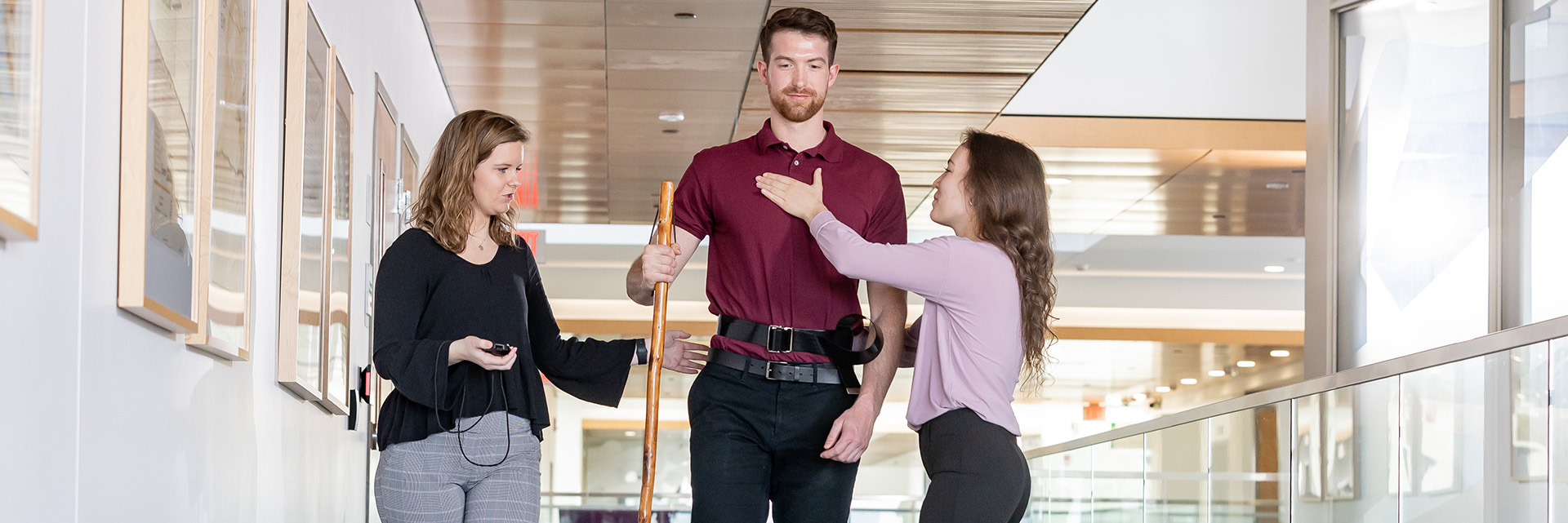
Program Overview
What is a Physical Therapist?
Physical therapists provide services to patients who have impairments, activity limitations, and participation restrictions related to environmental or personal factors. Physical therapists assist patients in restoring health; alleviating pain; examining, evaluating, and diagnosing changes in physical function and health status resulting from injury, disease, or other causes. Physical therapists are also involved with intervention, prevention, and the promotion of health, wellness, and fitness. They are employed by hospitals, outpatient clinics, rehabilitation centers, skilled nursing facilities, home care, school systems, industrial settings, athletic facilities, and in private practice.
About UND PT
The UND physical therapy program is accredited by the Commission on Accreditation in Physical Therapy Education (CAPTE).
Mission Statement and Program Goals
The mission of the Department of Physical Therapy is to empower students to become innovative, compassionate, and competent physical therapists who deliver high quality care to enrich the lives of North Dakotans and the global community. Through a robust foundation in liberal arts, clinical sciences, and professional ethics, our program cultivates leaders who advance the profession in clinical practice, research, education, and community service.
Students:
Goal 1
The student will demonstrate the skills necessary for the entry-level practice of physical therapy.
Goal 2
The student will demonstrate advocacy skills for health and wellness for all individuals and our diverse society.
Goal 3
The student will provide service to the diverse community and/or to the profession.
Goal 4
The student will develop critical inquiry skills related to clinical and basic science research.
Goal 5
The student will develop the skills required for life-long learning.
Faculty:
Goal 1
Faculty members will demonstrate excellence in teaching.
Goal 2
Faculty members will provide service and leadership to the physical therapy profession.
Goal 3
Faculty members will enhance the clinical and scientific knowledge base of physical therapy through creative and scholarly activities.
Department:
Goal 1
The Department will attract and support faculty who align with the mission and vision of the institution and the collaborative spirit of the program and curricular philosophies.
Goal 2
The Department will support and develop faculty who are recognized for advancing the physical therapy profession through excellence in teaching, clinical practice, scholarly activity, and service to the profession.
Student Outcomes
The pass rate on the National Physical Therapy Examination (NPTE) is typically above average for first-time test takers. The two-year graduation rate for students admitted to the program is 96.8% (2024-2025 graduates). The graduating class in 2025 demonstrated a graduation rate of 96.08%. The two-year average employment rate reported by licensed graduates within twelve months of graduation was 100% (2024-2025 graduates) and the 2025 graduating class reported 100% employment. The weighted, ultimate two-year pass rate on the NPTE is 96.8% (2024-2025). The first-time NPTE pass rate for the 2025 graduating class was 81.6% while the two-year first-time pass rate (2024 & 2025) averaged 87.15%. NPTE examination and pass rate information can be found on the Federation of State Boards of Physical Therapy website.
Program Tuition
Curriculum
- Pre-Physical Therapy: The first three years of the curriculum are considered pre-physical therapy.
All required coursework listed for the pre-physical therapy curriculum must be completed or underway before the student can apply to the professional program. There is a 90-credit pre-physical therapy entrance requirement. When coursework is near completion, the student is eligible to apply to the professional program that year.
- Professional Physical Therapy Program: The professional education component of the D.P.T. requires three full academic years including two summer sessions following completion of the pre-physical therapy entrance requirements. Students must be formally accepted into the professional education component of the D.P.T. and endorsed by the Chair of Physical Therapy. NOTE: Acceptance by the UND Office of Admissions or the School of Graduate Studies does not constitute acceptance into the professional program in Physical Therapy.